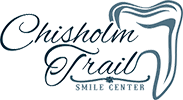If you suffer from recurring headaches that last for hours or migraines that pummel your head for days, the pain may stem from TMD, or temporomandibular joint dysfunction. Since symptoms of TMD overlap those of other conditions, the cause of your headaches may have been misdiagnosed. A second opinion could reveal the true cause of your symptoms.
Don’t let headaches and migraines rule your life! For TMD treatment and symptom relief, call Dr. Matthew Bridges and the team at Chisholm Trail Smile Center in Duncan. Located on West Elk Ave., our dental office serves patients of all ages. To schedule a TMD consultation, call 580-255-4880.
In today’s blog, you’ll learn:
- Causes of TMD
- Symptoms and Misdiagnoses Related to TMD
- Non-surgical treatment for TMD
What’s causing your headaches, migraines, and jaw pain?
Under your ears, about an inch toward your face, you can feel bulges under your cheeks. These are the hinge joints that hold your lower jaw to your skull, and they’re called TMJs or temporomandibular joints. When you open and close your mouth, the joints should glide, not click, pop, or lock.
All of your lower jaw movements involve the TMJs: speaking, eating, drinking, yawning, etc. If your TMJs ache, the connected muscles may feel sore because when your mouth is closed, they aren’t properly seated so they never rest. Even while you sleep, misaligned jaw joints continue trying to hold the mandible in the correct resting position, which offers no rest at all!
So what’s the root cause of TMD? One or more of these causes can trigger TMD:
- Stress
- Genetics
- Arthritis
- Jaw injury
- Bruxism
- Malocclusion
- Disc erosion
- Damaged cartilage
Symptoms of TMD
As stated, headaches, migraines, and popping or clicking jaw joints are common symptoms of TMD. You may also notice one or more of these symptoms as well as a declining quality of life.
- Pain in or over the TMJs
- Tenderness or aching of the jaw
- Earaches or tinnitus
- Jerky or painful chewing
- General pain in the face
- Joint locking, so you cannot fully open or close your mouth
- Limited range of motion in jaw joints
- Tooth pain in molars
- Vertigo or dizziness
- Swelling over or around the jaw joint(s)
- Neck and/or shoulder pain
The following conditions are sometimes misdiagnoses of TMD, according to the Merck Manual:
- Sinusitis
- Giant cell arteritis
- Tension or cluster headaches
- Postherpetic neuralgia
- Complex regional pain syndrome type 1
- Head or neck trauma
- Toothache
- Cardiac pain
- Salivary gland disorders
- Obstruction of ear canals or eustachian tubes
- Otitis media
- Fibromyalgia
- Whiplash affecting muscles or cervical spine
- Eagle syndrome
- Glossopharyngeal neuralgia
- Subacute thyroiditis
- Depressed fracture of the zygomatic arch
- Infection
- Pericoronitis
- Tetanus
- Osteochondroma of the coronoid process
TMD Treatment
At Chisholm Trail Smile Center in Duncan, Dr. Bridges offers TMD diagnosis and TMD treatment, without surgery. A simple oral appliance known as a TMD night guard keeps upper and lower teeth from touching while you sleep, ending any clenching and grinding issues (called bruxism).
The appliance also holds the jaw joints in their proper resting position, so they can actually rest and recuperate while you sleep. While this non-invasive treatment solution is not effective on TMD patients who need surgery, most TMD cases can be effectively treated without surgery, according to the Mayo Clinic.
Some patients wear the night guard indefinitely. Others find that the appliance retrains jaw joint musculature so that the jaw retains its ideal resting position when the mouth is closed, without wearing the night guard. These patients do not have to wear the night guard forever but can use it if and when symptoms reemerge.
If you suffer from TMJ pain, headaches, and other symptoms of TMD, contact us today to schedule a consultation with Dr. Bridges. You can submit a message online from our website or call 580-255-4880. We will help you get out of pain, once and for all!

